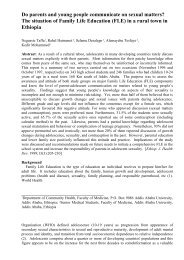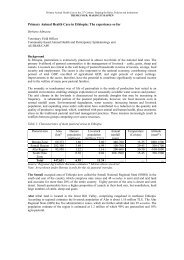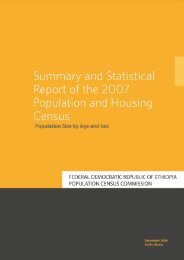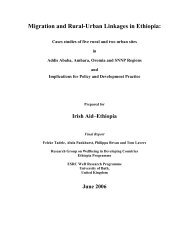Original article - Ethiopian Review
Original article - Ethiopian Review
Original article - Ethiopian Review
- No tags were found...
You also want an ePaper? Increase the reach of your titles
YUMPU automatically turns print PDFs into web optimized ePapers that Google loves.
<strong>Original</strong> <strong>article</strong>Community-based Family Planning services: Aperformance assessment of the Jimma FP CBDprojectAntenane Korra 1Abstract: Community Based Distribution (CBD) programs reach beyond the clinic walls toprovide contraceptives in the communities where people live. The ultimate goal of CBD programsis to improve the accessibility of contraceptive services and supplies. In view of this, the FamilyGuidance Association of Ethiopia (FGAE) has recently intiated CBD programs in some rural areas.The aim of this study is to assess the overall performance of the Jimma CBD project with respectto achieving the set objectives and measure the changes that have occurred in the levels ofknowledge and use of family planning methods among the eligible couples. Results of the studyshowed, that the knowledge of women about contraception appeared to be higher (76.9%) than theproportion reported in the baseline survey (36.9%). Comparing the contraceptive prevalence rateof 1.3% reported in the baseline survey, the rate reported in this study is found to be substantial(15.9%). Generally, the project achievement enlisted in the period of 21 months of operation wasfound to be impressive. Thus, replication of the program in other rural areas should be sought.[Ethiop. J. Health Dev. 1997;11(1):17-22]BackgroundIn developing countries, family planning services are delivered mainly through healthinstitutions. In the African context, the majority of the population does not have similar privilegesof ease of access to facilities for family planning service delivery, especially in rural areas. Thoughin some countries clinic-based family planning service delivery facilities exist, these services arefar from being adequate to meet the needs of the population demanding such services, (1).The introduction of modern family planning services in Ethiopia dates back to 1966, when theFamily Guidance Association of Ethiopia (FGAE) was founded as a non-governmental and not-forprofitorganization to provide information, counselling and clinical services to families whovoluntarily express their need and desire for spacing the birth of their children.when the Ministry of Health integrated family planning with the Maternal and Child Health care(MCH) services in 1980. Since then, family planning services have been offered throughgovernment static health institutions and other organizations. This approach, which has been clinicbasedand biased towards curative medicine, has remained remote from the potential and largesegment of family planning users residing in rural areas.To make family planning information and services accessible and affordable to the hard- to-reachrural communities, community-based distribution (CBD) programs have been practiced in manydeveloping countries and this approach brought about successful results in Asian and Africancountries. In view of this fact, expansion of community-based distribution of family planningservices is indicated as one of the basic implementation strategies in the National PopulationPolicy of Ethiopia launched in July 1993, (2).______________________________________1From the Family Guidance Association of Ethiopia, P.O. Box 5716, Addis Ababa, EthiopiaThe services have been further strengthened"The Jimma Family Planning Community- Based Distribution Project", funded by Population


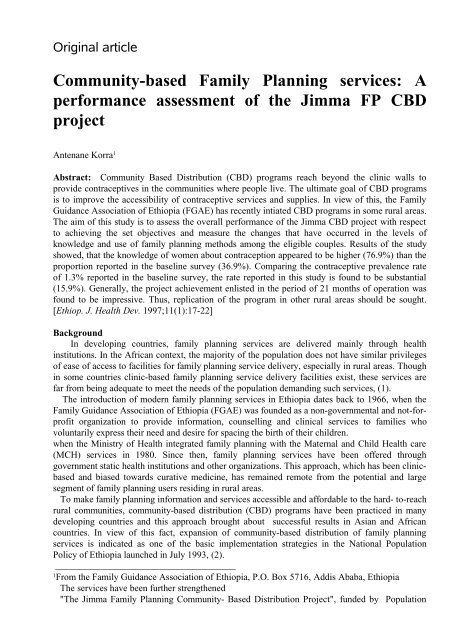

![to read the full report [pdf, Amharic] - Ethiopian Review](https://img.yumpu.com/52737829/1/190x245/to-read-the-full-report-pdf-amharic-ethiopian-review.jpg?quality=85)

